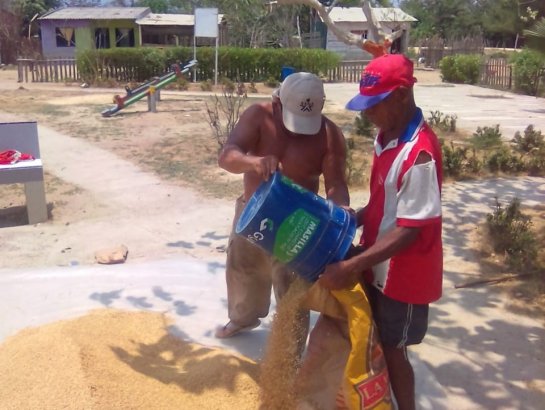“One by one we are all mortal. Together, we are eternal.”
These words of solidarity, written in the second century by Roman writer Apuleius, ring true in these times of COVID19-driven upheaval. Indeed, the farmers of Leticia, a vulnerable community near Cartagena, Colombia, embodied this sentiment when they decided recently to donate their precious zinc-biofortified rice production to the people of Cartagena — one of the locations in the country most affected by the current pandemic.
“We decided to donate 400 kilos of paddy rice. That comes out to about 250 kilos of rice to consume,” said Elías Marimon, a community leader affiliated with the Association of Agricultural Producers of Leticia and Canal del Dique. “Our rice is biofortified and will help with nutrition for our friends in Cartagena. We will give it all to the Municipal Unit of Agricultural Technical Assistance (UMATA) so that it can reach the mayor [of Cartagena] and let him decide how to distribute it.”
The Association comprises 24 farm producers, including women who are heads of households, who are growing trial plots of what is expected to be the first zinc-biofortified rice officially released in Colombia.
“The community is convinced that their contribution is a stimulus for many families in need, and a short-term help to overcome the crisis. It is also a way of giving back to society,” said Marimon.
He said the farmers of Leticia know that their donation is relatively small but “it is an incentive for many families. This can help people keep hope alive. With this we are, as a rural community, trying to help the country and thanking those organizations that have been by our side so that we can be better producers.”
Leticia is a village of about 500 inhabitants located on the banks of the Dique Canal. Getting there from Cartagena requires a 45-minute motorboat ride, or about two hours by a manually driven traditional chalupa boat. The roads in the area are unpaved, and despite being on the banks of the canal, Leticia has no drinking water service.
Since 2016, and HarvestPlus and a broad alliance of partners — including the Canal del Dique Foundation (COMPAS); the University of Córdoba, the Alliance of Bioversity and CIAT, and the National Learning Service (SENA) have been helping farmers in the area to cultivate zinc-biofortified rice as a subsistence crop. Thanks to the training received and the exceptional performance of this rice variety, today the community has a surplus and typically sells it to neighboring communities. But instead of doing so, they are donating the entire zinc rice harvest.
The Colombian Navy will help transport the biofortified rice to UMATA in Cartagena, and then it will be distributed by the mayor’s office to vulnerable families affected by the COVID-19 crisis.
Cartagena, which thrives on tourism, has the fifth-most COVID19 infections of any city in Colombia. A large part of its population work in the informal sector and they have been hit hard by the suspension of all tourism activities. The streets of the historic center and the city’s beaches, usually crowded with tourists, are now empty, as are its hotels, bars, and restaurants. In response, the city’s mayor’s office has arranged for the delivery of groceries and food vouchers to the most vulnerable families. It is expected that biofortified rice will be used in these relief efforts. .
The official national release of zinc-biofortified rice in Colombia is currently expected to take place by the second half of 2020, barring any disruption of these plans by COVID19. The National Federation of Rice Growers (FEDEARROZ) is conducting trials to promote the cultivation of this rice in other vulnerable communities in the departments of Sucre, Córdoba, and some communities affected by civil armed conflicts.
This naturally nutritious zinc rice will add to an existing biofortified food basked in Colombia that includes iron beans, zinc maize, and vitamin A sweet potato. When eaten regularly, zinc rice can provide up to 40 percent of daily zinc needs.
All biofortified crops promoted by HarvestPlus are developed through conventional breeding techniques in collaboration with CGIAR crop research centers and national agricultural research systems. For more information, visit: www.biofortificados.com.
